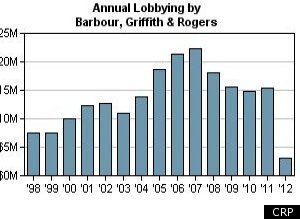WASHINGTON -- A top Republican lobbying shop lost major business over the past few years because clients thought "Obama was going to be dictator," and only firms closely aligned with the administration would have access, Ed Rogers, the head of BGR Group, said in a deposition taken in January.
BGR Group, founded by top Republican players Haley Barbour, Lanny Griffith and Rogers, peaked in 2007 with more than $20 million in revenue. In three years of the Obama administration, revenue has been down roughly 25 percent, according to the Center for Responsive Politics. Barbour returned to the firm in 2012 after two terms as Mississippi governor.
"There was a spike in people thinking that Obama was going to be dictator and to get a fair hearing, which is all you're ever really going to get or all you literally want, you had to be close to the Obama administration. We were not," Rogers testified.
"Well, was that just a perception or is that reality?" he was asked.
"It's a perception more than anything. Washington is becoming a town of what you know, not who you know," Rogers said.
Jeffrey Birnbaum, a spokesman for BGR Group, declined to comment.
In his deposition, Rogers also blamed the sagging economy, a saturated lobbying industry and some high-level departures for the downturn. "There was a dramatic turn in the macroeconomy, to the nature of the business, to personnel moving on, to increased expenses," he said.
Rogers' deposition was taken as a part of divorce proceedings. The divorce from his wife Edwina Rogers is becoming a hard-fought affair, and headed for open court, which could expose the powerful lobby shop's internal records to an unusual amount of scrutiny. Rogers is a prominent figure in Washington and regularly appears on National Public Radio as a Republican strategist.
BGR Group represents corporate clients and foreign governments, including Kazakhstan and a Russian bank with ties to Iran's nuclear program.
The firm was previously known as Barbour, Griffith & Rogers, but changed its name to "rebrand" the firm as bipartisan, Rogers said during his deposition.
"To rebrand the firm bipartisan, [we decided to] drop the Barbour, Griffith & Rogers. For some reason we picked the name BGR Holding. And nobody liked it. And we had cards and stationery and everything else. And nobody liked it, and so we changed it," Rogers said, to BGR Group.
Support HuffPost
Our 2024 Coverage Needs You
Your Loyalty Means The World To Us
At HuffPost, we believe that everyone needs high-quality journalism, but we understand that not everyone can afford to pay for expensive news subscriptions. That is why we are committed to providing deeply reported, carefully fact-checked news that is freely accessible to everyone.
Whether you come to HuffPost for updates on the 2024 presidential race, hard-hitting investigations into critical issues facing our country today, or trending stories that make you laugh, we appreciate you. The truth is, news costs money to produce, and we are proud that we have never put our stories behind an expensive paywall.
Would you join us to help keep our stories free for all? Your contribution of as little as $2 will go a long way.
Can't afford to donate? Support HuffPost by creating a free account and log in while you read.
As Americans head to the polls in 2024, the very future of our country is at stake. At HuffPost, we believe that a free press is critical to creating well-informed voters. That's why our journalism is free for everyone, even though other newsrooms retreat behind expensive paywalls.
Our journalists will continue to cover the twists and turns during this historic presidential election. With your help, we'll bring you hard-hitting investigations, well-researched analysis and timely takes you can't find elsewhere. Reporting in this current political climate is a responsibility we do not take lightly, and we thank you for your support.
Contribute as little as $2 to keep our news free for all.
Can't afford to donate? Support HuffPost by creating a free account and log in while you read.
Dear HuffPost Reader
Thank you for your past contribution to HuffPost. We are sincerely grateful for readers like you who help us ensure that we can keep our journalism free for everyone.
The stakes are high this year, and our 2024 coverage could use continued support. Would you consider becoming a regular HuffPost contributor?
Dear HuffPost Reader
Thank you for your past contribution to HuffPost. We are sincerely grateful for readers like you who help us ensure that we can keep our journalism free for everyone.
The stakes are high this year, and our 2024 coverage could use continued support. If circumstances have changed since you last contributed, we hope you’ll consider contributing to HuffPost once more.
Already contributed? Log in to hide these messages.


